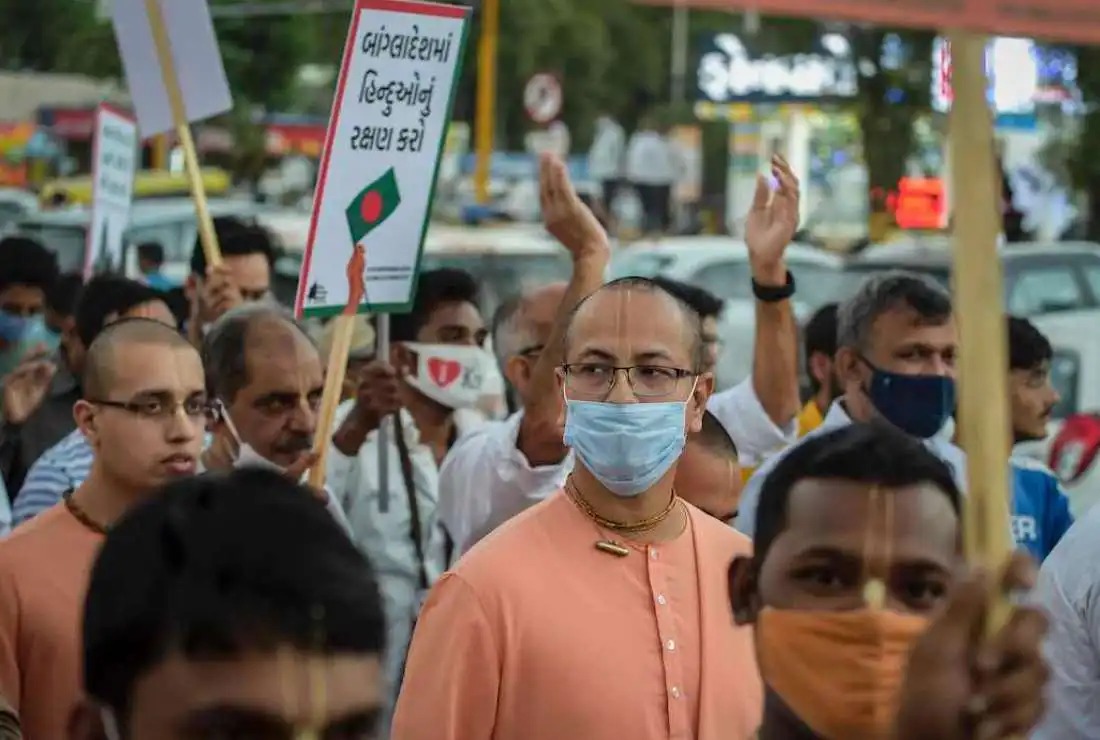
Source UCANews
HONG KONG, China: The Bangladesh government has agreed to establish a commission to protect the interests of its religious minorities -- Buddhists, Christians and Hindus -- two days after the country's largest forum of religious minorities launched a hunger strike.
Officials announced the government's decision to establish a minority commission by October, on Sept. 23, two days after the Bangladesh Hindu Buddhist Christian Unity Council (BHBCUC) began the indefinite hunger strike in Dhaka.
The council representatives ended the strike soon after the announcement came from Prime Minister Sheikh Hasina’s political adviser Kabir Bin Anwar and co-chairman of the ruling Awami League party’s election committee.
The council has been planning a series of protests across the nation through September pressing for government systems and policies to protect the rights and interests of religious minorities in the country, ahead of the January general election.
The government agreed to establish a commission after seven council leaders, including two women, who were on hunger strike were hospitalized.
Rana Dasgupta, council general secretary told UCA News that the government decision was taken during a “special parliament session” and “we trust the word given to us will not be broken.”
The ruling AL, in its 2018 election manifesto promised to return the land the government confiscated from religious minorities such as Hindus and Christians in the 1960s when Bangladesh was part of Pakistan (as East Pakistan).
The ruling party in 2018 also promised to set up a national minority commission to eliminate disputes among ethnic minorities and a special quota in jobs and education for ethnic minorities, children of tea garden workers and socially poor Dalits (former untouchables).
“We will meet on Sept. 27 to decide whether or not to hold the grand rally scheduled for October 6 to press AL to fulfill its electoral promises,” said Rana.
Council leaders like Dasgupta say religious minorities have faced repression and discrimination from Islamist forces even after Bangladesh became an independent nation in 1971, ending its links with Pakistan.
Those who opposed Bangladesh’s freedom, continue to attempt to take Bangladesh back to Islamization, which cannot tolerate religious pluralism, and continue to maintain a hostile attitude toward non-Muslims, minority leaders say.
Successive governments remained indifferent to attacks on minorities, denying them justice and protection.
In 2009, the High Court of Bangladesh instructed to appoint a commission to study the increasing attacks on religious minorities. However, the AL government did not make public the commission’s study report.
Minority leaders say their people have always been subject to attacks during all general elections reportedly to consolidate Muslim votes. They have already raised alarm over increasing attacks ahead of the general elections due in January.
Religious and ethnic minorities in Bangladesh formed 8.98 percent of the 165 million people in the country in 2022, according to the government census. Ten years ago they formed 8.61 percent. The data shows their number has been dwindling since 1971 when Bangladesh gained independence.
HONG KONG, China: The Bangladesh government has agreed to establish a commission to protect the interests of its religious minorities -- Buddhists, Christians and Hindus -- two days after the country's largest forum of religious minorities launched a hunger strike.
Officials announced the government's decision to establish a minority commission by October, on Sept. 23, two days after the Bangladesh Hindu Buddhist Christian Unity Council (BHBCUC) began the indefinite hunger strike in Dhaka.
The council representatives ended the strike soon after the announcement came from Prime Minister Sheikh Hasina’s political adviser Kabir Bin Anwar and co-chairman of the ruling Awami League party’s election committee.
The council has been planning a series of protests across the nation through September pressing for government systems and policies to protect the rights and interests of religious minorities in the country, ahead of the January general election.
The government agreed to establish a commission after seven council leaders, including two women, who were on hunger strike were hospitalized.
Rana Dasgupta, council general secretary told UCA News that the government decision was taken during a “special parliament session” and “we trust the word given to us will not be broken.”
The ruling AL, in its 2018 election manifesto promised to return the land the government confiscated from religious minorities such as Hindus and Christians in the 1960s when Bangladesh was part of Pakistan (as East Pakistan).
The ruling party in 2018 also promised to set up a national minority commission to eliminate disputes among ethnic minorities and a special quota in jobs and education for ethnic minorities, children of tea garden workers and socially poor Dalits (former untouchables).
“We will meet on Sept. 27 to decide whether or not to hold the grand rally scheduled for October 6 to press AL to fulfill its electoral promises,” said Rana.
Council leaders like Dasgupta say religious minorities have faced repression and discrimination from Islamist forces even after Bangladesh became an independent nation in 1971, ending its links with Pakistan.
Those who opposed Bangladesh’s freedom, continue to attempt to take Bangladesh back to Islamization, which cannot tolerate religious pluralism, and continue to maintain a hostile attitude toward non-Muslims, minority leaders say.
Successive governments remained indifferent to attacks on minorities, denying them justice and protection.
In 2009, the High Court of Bangladesh instructed to appoint a commission to study the increasing attacks on religious minorities. However, the AL government did not make public the commission’s study report.
Minority leaders say their people have always been subject to attacks during all general elections reportedly to consolidate Muslim votes. They have already raised alarm over increasing attacks ahead of the general elections due in January.
Religious and ethnic minorities in Bangladesh formed 8.98 percent of the 165 million people in the country in 2022, according to the government census. Ten years ago they formed 8.61 percent. The data shows their number has been dwindling since 1971 when Bangladesh gained independence.








0 Comments
LEAVE A REPLY
Your email address will not be published